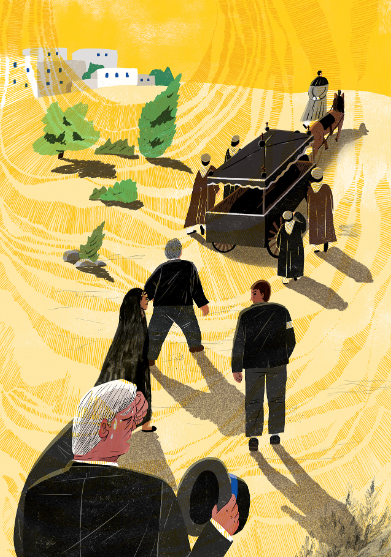Today I present to you what was perhaps one of my most complex readings this year, and I even ended up with a headache. I don't think I even know how I will do or finish this review, perhaps I will be quite brief because I think it is difficult to explain.
It is said that this book is one of the most read in the world, and I don't know if anyone here is following me in my posts, but if you have, you may have been able to notice that my readings are based on those books that are part of the most read, of course I have my own list and from time to time I take the time to read one or another book that is different from my list, since most of these books tend to be somewhat wide and long enough to end up in a short time as a busy person with little hours available in the day.
El día de hoy les presento lo que fue una de mis lecturas mas complejas quizá en este año, y hasta acabé con dolor de cabeza. Creo que ni siquiera sé como haré o terminaré este review, quizá seré bastante breve porque creo que se hace hasta complejo explicarlo.
Se dice que este libro es uno de los más leídos del mundo, y no sé si alguien de aquí me está siguiendo en mis posts pero sí lo ustedes lo han hecho podrán haber podido notar que mis lecturas están basadas en aquellos libros que forman parte de los más leídos, por supuesto tengo mi propia lista y cada tanto voy tomándome el tiempo de leer uno que otro libro diferente a mi lista, ya que mayormente estos libros suelen ser algo anchos y largos como para acabar en corto tiempo siendo persona ocupada con escasas horas disponibles en el día.

The Stranger (Original title in French: L'Étranger) by Albert Camus 1942. I would say that it is an old book but in reality not so much, since my mother was born in the 60's, if I take that as a reference, it no longer seems so old to me. ancient. The first thing that caught my attention about the book was the title, I thought it would be about some traveler at first sight and this because I wanted to relate it to my condition as a foreigner, but I couldn't have been more wrong. Although I think that this confusion at first is acceptable due to the definition of the word, however, once the book is finished we can understand that the title is due to the strangeness of this life of the protagonist, of a disconnection with the belonging of his own be. And in fact the title itself in French leads you to interpretation if we look for the meaning of the word, very well thought out.
This is a book, well, a novel that deals with a murder but this is not the central axis of this work. Meursault, the main character, is really the central axis and everything that being him implies. This book has 2 parts, and each part is divided into 5 chapters. I consider this division a job well done and it gives us the impression that there are 2 events that marked the character's destiny. Now I will proceed to explain a little about these two parts and there are probably SPOILER because I don't know how to explain anything while keeping too many details.
El extranjero (Título original en francés: L'Étranger)por Albert Camus 1942. Diría que es un libro antiguo pero en realidad no tanto, ya que mi madre nació en los años 60's si tomo eso como referencia, ya no se me hace tan antiguo. Lo primero que me llamó la atención del libro fue el título pensé que se trataría de algún viajero a primera vista y esto porque quise relacionarlo con mi condición de extrajera, pero mas equivocada no pude estar. Aunque creo que esta confusión en primera estancia es aceptable por la definición de la palabra, sin embargo, una vez concluido el libro podemos entender que el título se debe a lo extraño de esta vida del protagonista, de una desconexión con la pertenencia de su propio ser. Y de hecho el propio título en francés te lleva a la interpretación si buscamos el significado de la palabra, muy bien pensado.
Este es un libro, bueno, una novela que trata de un asesinato pero esto no es el eje central de esta obra. Meursault personaje principal, es realmente el eje central y todo lo que ser él implica. Este libro tiene 2 partes, y cada una de las partes se dividen en 5 capítulos. Esta división la considero un trabajo bien hecho y nos da a entender de que hay 2 hechos que marcaron el destino del personaje. Ahora procederé a explicar un poquito de estas dos partes y probablemente hay SPOILER porque yo no sé explicar nada guardando mucho detalles.

source
We are introduced to Meursault and the first thing that happens in the scene is that he receives news about his mother's death. And from here you begin to notice the character's indifference because upon receiving the telegram his first response was: "My mother died today. Or maybe yesterday, I don't know... I received a telegram from the asylum" and the next thing he did was ask permission in his work and heading to the asylum, in the book we can see that he tells us that he was in a neutral state, he did not show sadness. He also did not want to see his mother's body, and the next day at his mother's funeral he remained the same, after all this his only concern was returning to work.
Nos presentan a Meursault y lo primero que sucede en la escena es que recibe una noticia acerca del fallecimiento de su madre. Y desde aquí se empieza a notar la indiferencia del personaje porque al recibir el telegrama su primera respuesta fue: "Hoy mamá ha muerto. O tal vez ayer, no sé. He recibido un telegrama del asilo" y lo siguiente que hizo fue pedir permiso en su trabajo y dirigirse al asilo, en el libro podemos apreciar que nos dice que se encontraba en un estado neutral, no mostraba tristeza. Tampoco deseaba ver el cuerpo de su madre, y al día siguiente en el funeral de su madre se mantuvo igual, luego de todo esto su única preocupación era regresar al trabajo.

Source
From this event onwards, others begin to happen, as if in a chain. At least that's how I perceive it. A woman named Marie enters the scene. This woman helps us recognize that there is an indifference in the main character, that lack of feelings. Marie is a co-worker who declares her love for Meursault and even asks him if he loves her, to which he answers no in a cold and distant tone. This fact makes us as readers feel strange, but we begin to piece together the situation and we begin to understand that there is a lack of emotions, and with the events that happen later we begin to increase those suspicions. Well, what happens later is something quite tangled but it is part of the character's destiny.
A partir de este evento es cuando empiezan a suceder otros más como en cadena. Al menos así es como lo percibo yo. Entra en escena una mujer llamada Marie, esta mujer nos ayuda a reconocer que existe una indiferencia en el personaje principal, esa falta de sentimientos. Marie es una compañera de trabajo que le declara su amor a Meursault e incluso le pregunta a este si él la ama a ella, el cual él en un tono frío y distante le responde que no. Este hecho, a nosotros como lectores nos hace quedarnos extraños pero empezamos a hilvanar la situación y vamos entendiendo que hay una carencia de emociones, y con los hechos que pasan más adelante empezamos a aumentar esas sospechas. Pues lo que sucede más adelante es algo bastante enredado pero que forma parte del destino del personaje.

Source
Another character enters the scene Raymond, this is Meursault's neighbor. And what happens here is something very strange and even something incomprehensible to us, because when Raymond enters the scene it is to tell Meursault that he attacked his mistress and that he wants to return to her, so he asks her for help with some letters to our main character, however this is not all that happens with this character, this is the mere beginning. Meursault one day hears how this man mistreated his mistress and as a result of this the police intervene. And as if his neighbor's request were not enough, Meursault helps him and defends him. Later this same neighbor invites the character to spend a weekend at a cabin, at first the character was somewhat hesitant and makes you think that he will not go because of his answer but the opposite happens, and to end this first part, in this place there was a relative of Raymond's mistress, the neighbor was attacked and Meursault came out again in a kind of defense of this character, shooting him dead.
Otro personaje entra en escena Raymond, este es el vecino de Meursault. Y lo que sucede aquí es algo de lo más extraño e incluso algo inconcebible para nosotros, pues cuando Raymond entra en escena es para decirle a Meursault que este agredió a su amante y que quiere regresar con ella, entonces le pide ayuda con unas cartas a nuestro personaje principal, sin embargo esto no es todo lo que sucede con este personaje, esto es el mero inicio. Meursault un día escucha como este hombre maltrataba a su amante y a raíz de esto interviene la policía. Y como si no fuese suficiente a petición de su vecino, Meursault lo ayuda y lo defiende. Más adelante este mismo vecino invita al personaje a pasar un fin de semana a una cabaña, al principio el personaje se mostraba algo indeciso y te hace pensar que no irá por su respuesta pero sucede lo contrario, y para finalizar esta primera parte, en este lugar se encontraba un familiar de la amante de Raymond, el vecino fue atacado y Meursault sale nuevamente en una especie de defensa de este personaje, matándolo a tiros.

Source
This event marked Meursault's life, as he was sent to prison, certainly as it should be because he committed a crime. But here comes a part that I think turns around everything we were thinking in our heads. It is true that this part is when the justice process should be seen, however I believe that something else happens here, since a criminal must be judged for his actions, but when the interrogation part of the criminal process happens, the judge and The lawyers begin to inquire about his mother's death, and in fact there are many questions they ask him about it, and the protagonist, without knowing anything about what was happening, simply speaks frankly, he tells the whole truth. Mostly they ask him about how he felt. Everything revealed that part of the character is lacking in feelings. He is sentenced to death but we can notice right here that the sentence was not motivated by the action but seems to be made by the lack of sensitivity towards the death of his mother. YEAH! CRAZY! it doesn't say it explicitly but we realize it when reading the book.
Este hecho marcó la vida de Meursault, pues es enviado a prisión, ciertamente es el deber ser porque cometió un crimen. Pero aquí entra una parte que creo que le da una vuelta a todo lo que nosotros estábamos pensando en nuestra cabeza. Bien es cierto que en esta parte es cuando debe verse el proceso de justicia, sin embargo creo que aquí sucede otra cosa, pues un criminal debe ser juzgado por sus acciones, pero cuando sucede la parte del interrogatorio en el proceso penal, el juez y los abogados empiezan a indagar acerca de la muerte de su madre, y de hecho hay muchas preguntas que le hacen al respecto, y el protagonista sin enterarse de nada de lo que estaba sucediendo simplemente hablar con franqueza, él cuenta toda la verdad. Mayormente le preguntan es acerca de cómo se sintió. Todo dejó en evidencia esa parte del personaje que es carente de sentimientos. Él es sentenciado a muerte pero nosotros aquí mismo podemos notar que la sentencia no fue motivada por la acción sino que parece ser hecha por la falta sensibilidad hacia la muerte de su madre. ¡SÍ! ¡UNA LOCURAAAAA! No lo dejan dicho explícitamente pero nos damos cuenta al leer libro.

At this stage, when the character is trapped in his thoughts, he carries out many analyzes and generates hypotheses about life itself, since at first it is evident that he does not want that reality, being in a prison. However, we see that he ends up accepting his end, and that is how we understand that this is how he accepted his entire life from the beginning, a man who we notice never planned to live life, he just let it pass by being disconnected from what would be ours source of power, feelings.
En esta etapa cuando el personaje se encuentra atrapado entre sus pensamientos, realiza muchos análisis y genera hipótesis acerca de la vida misma, puesto que en un principio se nota que él no quiere esa realidad, el estar en una prisión. Sin embargo vemos que el termina aceptando su final, y es como comprendemos que así es como aceptó toda su vida desde un principio, un hombre que notamos que nunca se planteo vivir la vida, solo la dejó pasar al estar desconectado de lo que sería nuestra fuente de poder, los sentimientos.

source
This poor man is difficult to understand, which is why I say that it is a complex reading because I always try to put myself in the characters' shoes but when there is a lack of feelings my brain cannot click. As a teenager I thought that I was an insensitive young woman and then I realized that I was not because I really always had feelings, decisions, points of view according to my own criteria based on my personality that were connected to my emotions. So I tried to go back to that time to put myself in the character's costume but it wasn't easy for me to understand.
Meursault's character is something out of the ordinary, something that you do not encounter every day, because this is a character that lacks emotions, everything really seems indifferent to him and he is not pretending, he lacks feelings so the life of this character lacks value, for him in fact life is meaningless and he describes it as just a routine, so what happens around him simply does not interest him and he does not question it. In the end he ends up accepting his fate but it makes us wonder if that fate was really fair.
Este pobre hombre cuesta entenderlo, por esto digo que es una lectura compleja porque siempre trato de ponerme en lugar de los personajes pero cuando se carece de sentimientos mi cerebro no logra hacer clic. Cuando adolescente pensé que yo era una joven insensible y luego me di cuenta que no porque realmente siempre tuve sentimientos, decisiones, puntos de vistas según mis propios criterios basadas en mi forma de persona que, se conectaban con mis emociones. Entonces traté de irme a esa época para ponerme en el traje del personaje pero no me fue fácil comprender.
El personaje de Meursault, es algo fuera de lo común, algo que no te encuentras todos los días, pues este es un personaje que carece de emociones, realmente todo le parece indiferente y no está fingiendo, carece de sentimientos por lo que la vida de este personaje carece de valor, para él de hecho la vida es un sin sentido y la describe como una rutina sin más, así que, lo que sucede a su alrededor simplemente no le interesa y no lo cuestiona. Al final termina aceptando su destino pero a nosotros nos hace plantearnos si ese destino fue algo realmente justo.


